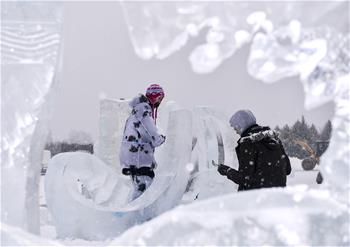TOKYO, Dec. 21 (Xinhua) -- Japan's Cabinet on Friday approved a record-high 101.46 trillion yen (913 billion U.S. dollars) budget plan for fiscal 2019, with soaring social security costs and military spending weighing on the country's already-fragile fiscal health.
According to the draft budget, the fiscal year starting from April 2019 will see record-high 77.95 trillion yen (701 billion U.S. dollars) earmarked for policy spending in the general account of the Japanese government.
Among the major outlays, spending on social security will rise to some 34.06 trillion yen (306 billion U.S. dollars), accounting for more than a third of the total budget, on the back of the increasingly aging society of Japan.
Defense spending, another major outlay, will hit a record-high of 5.26 trillion yen (47.3 billion U.S. dollars), rising for the seventh straight year since Abe took office in 2012, a growing concern for Japan's neighboring countries.
The defense budget will include a significant amount earmarked for preparations for the planned introduction of the land-based Aegis Ashore missile defense system and for purchasing a number of F-35A stealth fighters.
The budget plan also includes 2.03 trillion yen (18.3 billion U.S. dollars) for "extraordinary measures" intended to offset the impact of the government's plan to raise the consumption tax from the current eight percent to 10 percent on Oct. 1 next year.
The measures include enhancing the resilience of infrastructure such as roads and river embankments and procuring equipment for emergency services, as well as providing incentives for purchasing homes and cars, among other things.
Other expenditures include a total of 14.4 billion yen (130 million U.S. dollars) allocated to activities related to the abdication of Emperor Akihito and the ascension of Crown Prince Naruhito to the throne next year.
Debt serving expenses, including payment for interests, are to reach 23.51 trillion yen (211 billion U.S. dollars).
The spending is expected to be mainly covered by taxes and other revenues collected by the government, with tax revenue predicted to leap to 62.50 trillion yen (562 billion U.S. dollars), also a record high, as the government envisions a real economic growth of 1.3 percent in fiscal 2019.
The government, which uses debt for financing more than other developed economies, however, is still burdened with arrears that continue to stand as the highest in the industrialized world, amounting to more than twice the size of Japan's economy.
Japan has delayed its target of turning primary balance deficit into a surplus from fiscal 2020 to fiscal 2025, but the outlook still seems slim, as government estimation shows that it could run a primary deficit of at least 2.4 trillion yen in fiscal 2025.
Yuichiro Tamaki, leader of the opposition Democratic Party for the People, said that with fiscal reconstruction efforts making no progress, Japan's fiscal condition is getting closer to a crisis.
Yukio Edano, who heads the Constitutional Democratic Party of Japan, said that many of the items in the defense budget are problematic and are harmful to Japan.
The draft of the initial general-account budget, along with a second supplementary budget for fiscal 2018 worth 3.04 trillion yen (27.4 billion U.S. dollars), will be submitted to the Diet in January next year.













